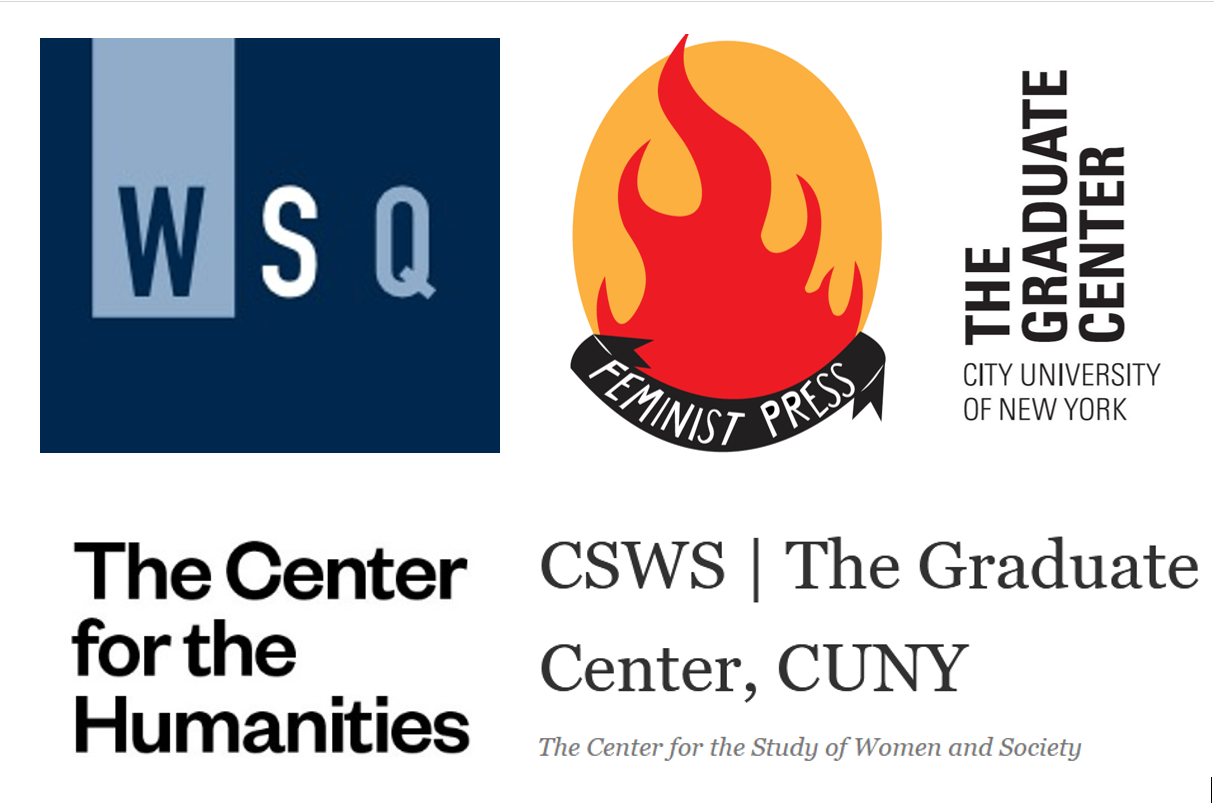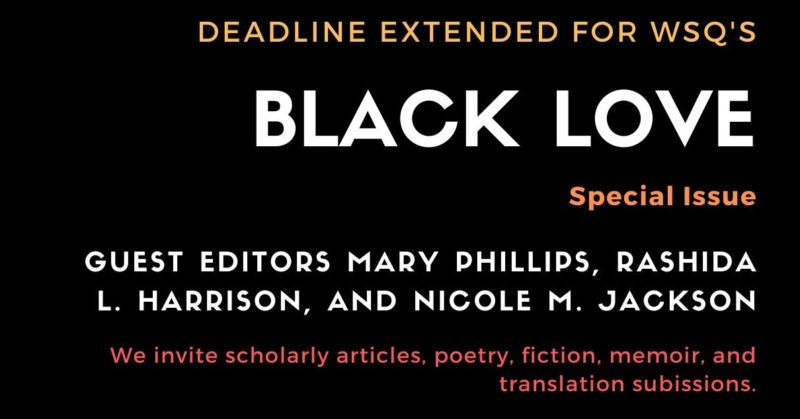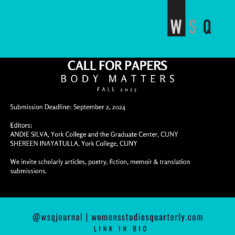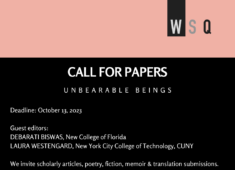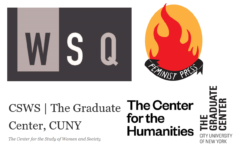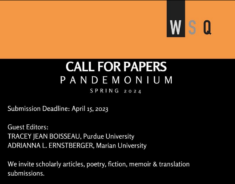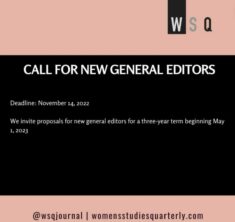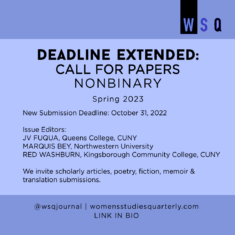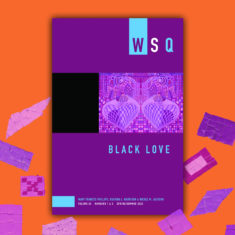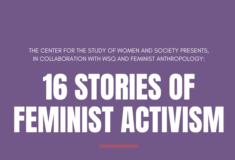About this Call for Papers
Having recently partnered with Women Studies Quarterly (WSQ), The Center for the Humanities is excited to share this call for papers for a special Spring 2022 WSQ issue Black Love which will be guest edited by Mary Phillips, Rashida L. Harrison, and Nicole Jackson, in collaboration with WSQ's publisher The Feminist Press and fellow partner The Center for the Study of Women and Society at The Graduate Center CUNY.
WSQ, Spring 2022 Special Issue: Black Love
Guest Editors:
- Mary Phillips (WSQ Editorial Board & Lehman College, Assistant Professor of Africana Studies)
- Rashida L. Harrison (Michigan State University, Assistant Professor of Social Relations and Policy)
- Nicole M. Jackson (Bowling Green State University, Associate Professor of History)
Extended Deadline: April 30th, 2021
During the summer of 2018, two public acts of love demonstrated the politics and gendered nature of enacting love and care by and for people of color. On July 4, 2018, in protest of the federal government policy separating immigrant children from their parents at the U.S. border, activist and immigrant from the Democratic Republic of Congo, Therese Patricia Okoumou, climbed the Statue of Liberty The symbolic nature of Okoumou’s protest to climb the Statue of Liberty highlighted that, in Okoumou’s words, instead of welcoming them “what we showed them is cages. So if I go in a cage with them, I am on the right side of history.” After being found guilty by the state of New York she defined her political action as centered in empathy and care for dispossessed people, offering the potential for radical solidarity based on love.
On July 29, 2018, during a major league baseball game, Atlanta Braves players Curacaoan Ozzie Albies and Venezuelan-born Ronald Acuna Jr. shared an intimate embrace in the dugout. Responses to this public display varied, which ultimately denied these men the space to show affection, demonstrating the depths of toxic masculinity and the feminization of emotion. But, as one person commented on Twitter, “Men of color loving themselves and one another is truly a revolutionary act!” The response to Albies and Acuna’s embrace illustrates that societal expectations for emotional displays of care and love are gendered and raced and thus “characteristic of some bodies and not others” (Ahmed 2014, 5).
This special issue of the WSQ seeks to focus on groups that imagine a world beyond limitations imposed by borders to conceptualize for themselves what justice looks like when we center love and care at the heart of our politics. Moving away from the mere ephemeral, this issue explores the moment love moves from theory to practice. As bell hooks has noted, “We need to concentrate on the politicization of love, not just in the context of talking about victimization in intimate relationships, but in a critical discussion where love can be understood as a powerful force that challenges and resists domination” (1989, 26). The policing of affect within Black diasporic communities and the larger public hinders our ability to see love as a collective and political tool. On the other hand, Robin D. G. Kelley asserts that “once we strip radical social movements down to their bare essence and understand the collective desires of people in motion, freedom and love lay at the very heart of the matter” (2002, 12). The chasm between the actual policing of affect and Kelley’s vision in Freedom Dreams is that we do not have a clear definition of love. Without it, we are unable to uncover its radical potential as a pathway to freedom.
We invite papers that interrogate Black love as a concept and tool for forming, sustaining, and fragmenting global Black communities in the twentieth and twenty-first centuries. Submissions might attend to questions such as: What are the histories and legacies of Black love? How have expressions and practices of Black love changed across locales and periods? What does it mean to lead with care in everyday actions? What does it mean to transgress boundaries of affect? What does it mean to jeopardize one’s freedom for one’s community? What does it mean to lead with care in everyday actions? How do gender roles and affect shape political engagement? How do we reconcile loving harmful Black folks as they are violent toward us?
Possible Topics:
- Diasporic Solidarities
- Parental Incarceration and Family Separation
- Restorative and Healing Justice Projects
- Intercommunal Feminist Praxis
- Self-Love Affect Studies
- The Politics of Beauty and Hair
- (Community) Parenting Consciousness Raising
- Social Media Studies
- Masculinity
- Performativity
- Radical Friendships and Intimacy
- Queer Community Formation
- Pleasure and Sex Work
- Community Healing and Self-Care
- Protest, Rebellion, Riot
- Trans-inclusive Feminist Politics
- Religion and Spirituality
- Sexuality
- Disability Studies
- Iconic Figures/Popular Culture
- Fat Studies
- Cultural Production-Visual Arts/Theatre
SUBMISSION GUIDELINES
Deadline: April 30th, 2021
- Scholarly articles should be sent to guest issue editors Mary Phillips, Rashida L. Harrison, and Nicole M. Jackson at [email protected]. We will give priority consideration to submissions received by March 1, 2021. Please send complete articles, not abstracts.
- Submissions should not exceed 6,000 words (including un-embedded notes and works cited) and should comply with the formatting guidelines at
- Poetry submissions related to the issue theme should be sent to WSQ’s poetry editor at [email protected] by April 30th, 2021. Please review previous issues of WSQ to see what type of submissions we prefer before submitting poems. Please note that poetry submissions may be held for six months or longer. Simultaneous submissions are acceptable if the poetry editor is notified immediately of acceptance elsewhere. We do not accept work that has been previously published. Please paste poetry submissions into the body of the e-mail along with all contact information.
- Fiction, essay, memoir, and translation submissions related to the issue theme between 2,000 and 2,500 words should be sent to WSQ’s fiction/nonfiction editor, at [email protected] by April 30th, 2021. Please review previous issues of WSQ to see what type of submissions we prefer before submitting prose. Please note that prose submissions may be held for six months or longer. Simultaneous submissions are acceptable if the prose editor is notified immediately of acceptance elsewhere. We do not accept work that has been previously published. Please provide all contact information in the body of the e-mail.
ABOUT WSQ: Since 1972, WSQ has been an interdisciplinary forum for the exchange of emerging perspectives on women, gender, and sexuality. Its peer-reviewed interdisciplinary thematic issues focus on such topics as Asian Diasporas, Protest, Beauty, Precarious Work, At Sea, Solidarity, Queer Methods, Activisms, The Global and the Intimate, Trans-, The Sexual Body, and Mother, combining legal, queer, cultural, technological, and historical work to present the most exciting new scholarship, fiction, creative nonfiction, poetry, book reviews, and visual arts on ideas that engage popular and academic readers alike. WSQ is edited by Brianne Waychoff (Borough of Manhattan Community College, CUNY) and Red Washburn (Kingsborough Community College, CUNY) and published by the Feminist Press at the City University of New York, and supported and co-sponsored by the Center for the Humanities and the the Center for the Study of Women and Society at The Graduate Center, CUNY. Visit http://www.feministpress.org/w...
